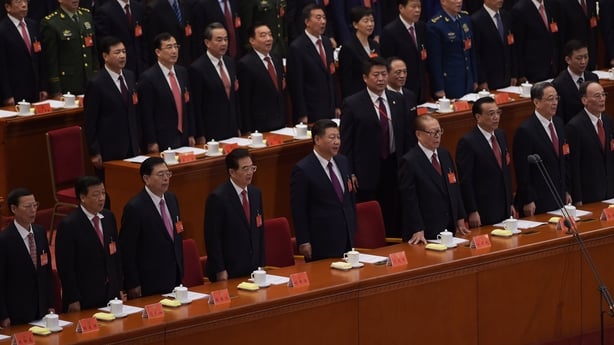President Xi Jinping has said China will deepen economic and financial reforms and further open its markets to foreign investors as it looks to move from high-speed to high-quality growth.
China will push ahead with market-oriented reforms of its foreign exchange rate as well as its financial system, and let the market play a decisive role in the allocation of resources, Mr Xi said at the opening of a key, twice-a-decade Communist Party Congress.
"China's open door will not be closed, it will be only be opened wider," Mr Xi said.
The mostly closed-door summit is expected to give him a second five-year term at the helm of the world's second largest economy.
More than 2,000 delegates are attending the week-long conclave, which will culminate with the selection of a new Politburo Standing Committee that will rule China's 1.4 billion people for the next five years.
The government will "clean up rules and practices that hinder a unified market and fair competition, support development of private firms and stimulate vitality of all types of market entities," Mr Xi said, while pledging to further open China's services sector to foreign investors.
However, while expressing support for market reform and private firms, Mr Xi also called for stronger, bigger state firms.
The government will "promote strengthening, improvement and expansion of state capital, (and) effectively prevent loss of state assets, deepen reform of state-owned enterprises,development a mixed-ownership economy and cultivate globally competitive world-class firms," Mr Xi said.

The president's comments reiterated a long-standing pledge by party leaders to give a greater role to free-market forces to improve efficiency and put the economy on a more sustainable growth path.
But as Mr Xi gears up for his second five-year term, foreign business executives and analysts increasingly believe market liberalisation is seen as secondary to his state-centred approach to economic policy and his focus on stability.
Other painful reforms that many economists say are needed have also moved slowly under Mr Xi. They include overhauling China's bloated and debt-laden state sector, fixing the fiscal system to tackle local government debt and bringing in new property taxes to ward off housing bubbles.
China should also strengthen consumption as a foundation for economic development, Mr Xi said, and will expand the middle class and narrow the gap in development between rural and urban areas.
Beijing's campaign to rein in high debt levels and industrial overcapacity will continue as part of supply-side structural reforms, Mr Xi said.
Fiscal reform has also been a key objective of policymakers as Beijing tries to make local governments take more responsibility for their own budgets and debt.
Timeline of China's leaders since 1949 as the Communist Party Congress opens in Bejing https://t.co/k5YPLKSGj4 pic.twitter.com/rxKvo6Navc
— AFP news agency (@AFP) October 18, 2017
Since assuming the party leadership in 2012, Mr Xi has consolidated power swiftly, locking up political rivals for corruption, restructuring the military and asserting China's rising might on the world stage.
Close attention will also be paid to any moves that would enable Mr Xi to stay on in a leadership capacity after his second term ends in 2022.
That could include resurrecting the position of party chairman, a title that would put him on par with Mao Zedong.
One of the most important signals for that would be whether - or how often - Mr Xi is referred to as "lingxiu", or leader.
That honorific has been bestowed only on two others since the founding of the People's Republic of China in 1949: Mao and his short-lived successor, Hua Guofeng.
As with other major set-piece events held in the capital, Beijing has been blanketed with security.

